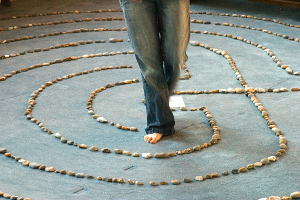Repentance. Many of us understand this word to indicate turning away from sin, or a feeling of contrition for something we’ve done. Many of us associate it with an element of guilt. But the Hebrew definition of repentance is more akin to a changing of one’s mind. In Hebrew, the concept is much more concrete because within it is encompassed the idea that in changing your mind, you also change your actions. Not just thoughts, not just words, deeds.
As in the Labyrinth, the path of repentance is very clear. It may seem meandering, but every step brings you closer to the center – your center – and traveling it provides the opportunity for true transformation. Space for reflection, silence for a quieting of the mind, and time for decision making; all to be found along the path.
As in the Labyrinth, the path of repentance has no dead end. Although it may seem as though you aren’t making progress in a linear fashion, each step brings you closer to the goal. The path provides a space and opportunity for continued evolution toward right-ness, toward goodness, (and in the realm of religion) toward God. Changing your mind, transforming your thought processes, modifying your actions. A reshaping and renewal of the way you live in the world.
In the Jewish tradition, the period of repentance and atonement that begins today with Rosh Hashanah is a journey taken annually. As with the Labyrinth, once you reach the center, you tread the path out to return to where you began. This is not a once-in-a-lifetime quest; there is always room for a change of mind, for using what we have learned on our journey to inspire us to improve our way of being. Know better, do better. This is the path of the labyrinth. This is the path of repentance.
What transformative journey are you embarking on today?
L’Shanah Tovah
~ Christiana

